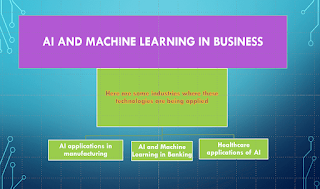Recognizing the distinctions between artificial intelligence (AI) and machine learning
Although the phrases artificial intelligence
(AI) and machine learning are sometimes used synonymously, it's critical to
realize that machine learning is in fact a subset of AI. Let's examine their
distinctions and how they are applied in various fields so that we can fully
comprehend these notions and how they are used.
What is Artificial Intelligence (AI)?
The discipline of artificial intelligence (AI)
is concerned with creating machines and software that can mimic and, in some
cases, outperform human talents. AI-based systems have the ability to
contextualize, analyze, and act on data without the need for human
intervention. Many of the modern technologies we use on a daily basis, including
voice assistants like Siri on Apple devices, are powered by AI.
Businesses are incorporating AI technologies
like natural language processing, which enables computers to comprehend and
utilize human language, and computer vision, which enables computers to analyze
images, automate processes, hasten decision-making, and let users
communicate with chatbots.
What is Machine Learning?
AI's subfield of machine learning uses
algorithms to provide systems the ability to automatically learn from data,
find patterns, make judgments, and get better over time. Programmers challenge
the limits of a computer system's capacity to enhance perception, cognition,
and behavior when they explore machine learning.
Deep Learning is a cutting-edge approach to
machine learning that uses enormous artificial neural networks to learn complex
models and generate predictions automatically, without human input.
AI and machine learning in business
Both big and small businesses are trying to
turn their data into useful insights for success in practically every industry.
Automation of manual procedures involving data and decision-making is made
possible by AI and machine learning. Here are some industries where these
technologies are being applied:
AI applications in manufacturing
Efficiency in the manufacturing sector is
essential. Through the Internet of Things (IoT), analytics, and machine
learning, AI is utilized to automate tasks like spotting equipment faults. It
is also used to forecast when maintenance on production machinery is best done.
AI is often employed in HVAC (heating, ventilation, and air conditioning)
systems to reduce energy usage.
AI and Machine Learning in Banking
Security of data is essential in the banking
industry. Managers in the financial services industry are utilizing machine
learning to identify and stop cyberattacks and fraud. In order to identify
consumers and automate customer service tasks utilizing chatbots and voice
assistants, they are also incorporating AI technologies such as biometrics and
computer vision.
Healthcare applications of AI
The delivery of precise and effective
healthcare services depends on IT and analytics, which are both heavily
utilized in the healthcare sector. AI is employed in a variety of applications,
including the analysis of electronic health records, clinical decision
assistance, hospital visit outcomes prediction to prevent readmissions, and
even the recording of interactions between patients and healthcare
professionals during telehealth consultations.
In conclusion, AI and machine learning are
potent tools that are revolutionizing how businesses use their data and
streamline their operations. These technology developments present a wide range
of corporate sectors with significant opportunities to increase productivity,
decision-making, and services.
See also:



